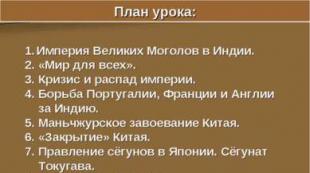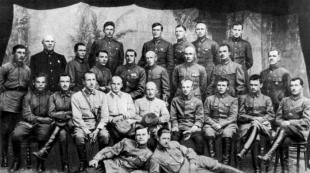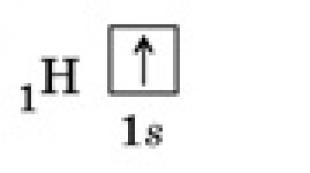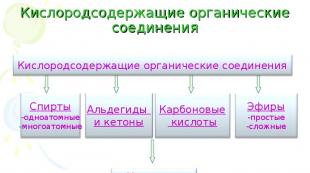Sentences with subordinate clauses from works of art. Complex sentences with adverbial clauses. SPP with subordinate clauses lesson plan in the Russian language (grade 9) on the topic. Is it true that SPPs are complex proposals
Complex sentences with adverbial clauses.
Subordinate clauses of place.
Subordinate clauses of time.
Preliminary preparation for the lesson
As preliminary preparation for the lesson, students are asked to review theoretical material about types of subordinate clauses, subordinate clauses of place and time, and perform several repetition exercises.
Goals:
1) repeat theoretical material devoted to the study of the topic “Complex sentences with adverbial clauses”;
2) develop the ability to competently and quickly distinguish among themselves the types of subordinate adverbial clauses;
3) cultivate love and interest in the native language.
Equipment: textbook, table.
Lesson type: application and improvement of knowledge.
During the classes
I. Organizational moment
II. Checking homework
Exercise 1 (to review theoretical material)
Fill in the blanks in the table on the next page (answers are in parentheses).
III. Working on new material
The teacher announces the topic of the lesson.
Subordinate clauses of place
The teacher draws the following diagrams on the board:
[...where...).
[...where...).
[qualified noun], (where...).
[verb], (where...).
[...where...), ...].
Teacher: Determine the type of sentences presented in front of you in schematic form. (Complex adverbial sentence with subordinate clause.) Make up sentences according to the appropriate schemes and write them down.
Types of adverbial clauses | Conjunctions and allied words | |
Mode of action and degree | how, how much, how much, what, so that, as if, as if, as if | [The student was able to complete the task exactly as the teacher asked him to.] |
[Where. where, from] | I went where the red arrow pointed. |
|
[when, when... then, until, barely, as soon as, since (since), until (until)] | When we got ready to leave the forest, it was already dark. |
|
[if (if... then), when, times] | [Looking at the sun for too long can damage your eyesight.] |
|
[Causes] | Because, because. due to the fact that, since, for, due to the fact that | Due to the fact that the road was covered with an even layer of fluffy snow, it was impossible to drive through. |
so that, in order to | It takes some effort to catch fish from a pond. |
|
[Comparisons] | How, with what, with what - as if, as if, exactly | [Quietly, as if a light wind ran through the clearing, she walked along the corridor] |
[although, despite the fact that, no matter how] | [Despite the fact that the moon is practically not appeared from behind the clouds, it was light outside the window.] |
|
Consequences | The snow was falling in thick sticky flakes, so that nothing was visible on the street. |
Exercise 1
Make complex adverbial clauses with subordinate clauses from simple sentences and write down the resulting sentences. Make a diagram for each sentence, highlight the means of introducing a subordinate clause into a complex one.
1. The city of K(o)lomna is located in the (M/m)Oskovsky region, at the confluence of the Moscow(-)river into the Oka. 2. People rushed headlong to the place of the fall of a(pp/p)arat. 3. I was given an appointment near the intersection of (M/m)oskovskaya and (S/s)aratovskaya streets. 4. The car had an accident near a sharp turn in the road. 5. In the forest, we stopped in a clearing next to a tree damaged by lightning. 6. We did not remember the meeting place with the other participants of the marathon.
Subordinate clauses of time
The teacher writes the following sentences on the board:
1. When the lilac blossomed in a light foam in the yard, I hit the road.
2. I felt completely recovered when I could speak without difficulty.
3. Warmth will come to us only when the sun lingers for a long time in the high sky.
Teacher: Try to make diagrams for each of the given sentences, and also determine the order of the main and subordinate clauses.
(1. (when...), ; subordinate clause - main;
2. , (when...); the main thing is the subordinate clause:
3. [only then], (when...) the main thing is the subordinate clause).
Teacher: The presented sentence patterns refer to complex sentences with clauses of time. Such sentences express the meaning of the time of a certain phenomenon or action. The order of the main and subordinate clauses is free: the subordinate clause can appear at the beginning or end of the sentence, and it can also be surrounded by the structure of the main clause. (For example: Only when it snowed was I able to get out of the house.)
The main means of joining a subordinate clause to the main one are the allied words when (in a subordinate clause), then, only then, etc.
A sentence complicated by the construction of a subordinate tense is subject to the standard rule of placing a comma, separating the main and subordinate clauses.
Exercise 2
Dictation. Write down the text from dictation, paying special attention to punctuation marks and spelling patterns of continuous or separate writing. Find complex sentences in the text, determine the type of subordinate clauses. Prove the accuracy of the type definition. Highlight the main parts of sentences and the means of joining subordinate clauses to the main ones.
Steppe. In all directions, the flat land stretches far (-) far away - not covered with buildings (,) or forests - nothing (,) except low growth of wild grasses and sown grain.
The wind in the steppe is like a song(,) you can listen to it for hours. During the day(,) when the sultry air is heavy and restless(,) all you can hear is the wind. And only in the evening(,) when the air ocean(,) washing the earth(,) gradually calms down in transparent silence(,) other sounds become audible.
There is a lot of life in these desert plains(,) called the steppe. And among the voices of living nature, a new (,) song of machines that recently burst into the steppe choir sounds in the endless expanses. There is no such corner in our steppes(,) where machines penetrate... They have firmly and inseparably entered the steppe landscape. Wherever you wander through the fields(,), the crowing of cranes and the singing of larks is echoed by the metallic(,) softly rumbling song of machines (V. Ovechkin).
(The wind in the steppe is like a song, you can listen to it for hours. - subordinate comparison. The wind is like a song, you can listen to it; how.
During the day, when the sultry air is heavy and restless, all you can hear is the wind. - subordinate tense. The wind is heard, the air is heavy and restless; When.
And only in the evening, when the ocean of air washing the earth gradually calms down into transparent silence, other sounds become audible. - subordinate tense. The ocean calms down, sounds become audible; only when.
There is no corner in our steppes where machines cannot penetrate... - subordinate clause. There is no corner, cars have entered; like this, wherever.
Wherever you wander through the fields, the crowing of cranes and the singing of larks is echoed by the metallic, softly rumbling song of machines. - subordinate clause. You have wandered, the song echoes; wherever, everywhere.)
IV. Summarizing
To summarize, students are asked to discuss the solution to dictation tasks.
V. Homework
Exercise
Write a text on any topic from several interconnected sentences, compiled according to the following schemes:
1. , (while...).
2. [..., (until), ...].
3. (if...), [then...].
4. [such...], (wherever...).
5. [that], (that...).
6. [only..., (when), ...].
SPP with adverbial clauses. Slide No. 1
Consolidate knowledge about NGN with attributive and explanatory clauses; - give a general idea of adverbial adverbs;
To develop the ability to distinguish between types of adverbial adverbs by meaning, questions, means of communication;
Improve spelling and punctuation literacy.
Organizing time.
(Mutual greetings, identifying absentees, checking students’ readiness for the lesson, etc.)
II. Repetition
"Check your literacy." Insert missing letters where necessary. Slides No. 2-3
Chicken..y, calc..command, uninvited, ac..accompaniment, same age..literate, due to.. rain, forged.., charming, dangerous, windless.
Write down the inserted letters in a row. What word did you get? (ocean)
Differentiated work.
Group 1 (work independently; diagrams are printed)
Make sentences using diagrams, determine the type of subordinate clauses.
A) (Where...), [ch. ].
u/r: No one could say where he was hiding for several days. (come to explain)
B) [Noun, (which...),...].
u/r: After a minute, which seemed like an eternity to everyone, he appeared at the gate. (add. define.)
B) (Who...), [that...].
n/r: Whoever trades his homeland will not escape punishment. (proverb) (adj. local-determinative)
Group 2 (work independently) Slide No. 4
Copy, place punctuation marks, make diagrams, determine the types of subordinate clauses.
A) The comrades asked me if there really was a brood in this ravine.
B) It was hard these days for those who left their native places.
B) We settled down for a rest near a village that grows right in the water.
Group 3 (work with a teacher)
Write down sentences, determine the types of subordinate clauses.
A) The street, which seemed extinct, suddenly came to life.
[ Noun, (which ...), ... ]. (add. define.)
B) I could not determine where the rustling sound was heard.
[ch. … ], (Where …). (come to explain)
C) He who is brave is confident in himself.
(Who...), [that...]. (adj. local-deterministic)
Checking the work of groups 1 and 2.
3. Game (written on the board)
Based on the fragments of sentences, determine which of them are NGN and which are SSP.
A) ... was there and they ...
B) ... by the tail which ...
B) ... the wolf also ran ...
D) ... saw how the wind ...
III. Communicate the topic and objectives of the lesson.
Today we will get acquainted with the types of adverbial clauses. Most adverbial clauses have the same meanings as adverbials in a simple sentence, which means they answer the same questions and are divided into the same types.
Remember what types of circumstances do you know? (Mode of action, degree, place, time, condition, reason, purpose, concession)
How do we distinguish between types of circumstances? (For questions)
We will also distinguish types of adverbial clauses by questions, as well as by conjunctions and allied words with the help of which they are attached to the main sentence.
Study the types of adverbial clauses using the table (printed for each desk).
| Type of subordinate clause | What is it attached to? | |
| Mode of action or degree | How, how much, how much, what, so that, as if, as if, as if, etc. | My peasant worked so hard that the sweat rolled off him like hail. |
| Where, where, where | Where the vines bend over the pool, where the summer sun bakes, dragonflies fly and dance, and they lead a merry round dance. |
|
| When (once...then), until, as soon as, barely, since (since), until (until), etc. | I will return (when?) when our white garden spreads its branches like spring. |
|
| If (if...then), when, times, etc. | When there is no agreement among the comrades, things will not go well for them. |
|
| Because, because, due to the fact that, since, for, due to the fact that, etc. | Mishutka does not go to school because he is barefoot. |
|
| In order to, in order to, etc. | In order to cross the river, one had to stay firmly on one's feet. |
|
| Comparisons | How, with what, with what - as if, as if, exactly, etc. | Before the thunderstorm, the forest became quiet (how?), as if everything had died. |
| Although, despite the fact that, no matter how | The leaves on the trees did not turn yellow or fly off, no matter how much the wind whistled at night. |
|
| Consequences | The heat kept increasing, so it became difficult to breathe. |
IV. Consolidation.
1) Determine the type of subordinate clauses. Slide number 5
1) I wrote down this story as I heard it from my friend’s lips.
2) For a long time, my tireless dog continued to scour the bushes, although she herself, apparently, did not expect anything worthwhile from her feverish activity.
3) Dasha’s heart was beating so much that she had to close her eyes.
4) I’ll be happy to talk if the person is good.
5) All work is also a game if you love work.
6) Where Razin was born, people don’t like timidity.
Write down sentence No. 2 in your notebook, explain the punctuation marks graphically. (SPP with adverb of concession; the subordinate clause is complicated by the introductory word “apparently”)
2) Recording a proposal. Slide number 6
Mercy will begin to warm our souls if everyone does at least a little, spends a minute of precious time, applies at least a little warmth.
Determine the type of subordinate clause in the IPP. (additional conditions)
Assignments (preparation for the OGE)
Determine how many grammatical stems are in the written sentence (2)
Outline the grammatical basics (1) mercy will begin to warm; 2) everyone will do, spend, apply)
Make a sentence diagram, (if... oh, oh, oh).
Write down a phrase connected by the method of “coordination”, “control”, “adjacent” (for example, our souls, will spend a minute, will begin to warm)
3) Differentiated work.
A) Creative work in pairs. Slide number 7
Make up a dialogue with a friend so that the questions begin with the words How? how? When? If? For what? etc., and the answers contained complex sentences with adverbial clauses.
B) Individual work (tasks are printed for several students)
Continue the sentences by making them IPPs with the indicated type of subordinate clauses
a) Despite the fact that it rained... (adv. concessions)
b) I haven’t learned my lessons... (give reasons)
c) ...had to prepare for the night. (add. consequence)
4)Testing followed by mutual testing (OGE-type tasks). Slides No. 8-12
1) Indicate the SPP number with an adverbial clause.
1. The letter that you wrote to me made me happy.
2. There is no truth where there is no love.
3. It is not without reason that they say that the master’s work is feared.
2) Among sentences 1-3, find a complex sentence with a subordinate clause
1) There I was involuntarily distracted, I was forced to do something all the time, the guys there bothered me, together with them - like it or not - I had to move, play, and work in class. (2) But as soon as I was left alone, longing immediately fell upon me - longing for home, for the village. (3) Never before had I been away from my family, even for a day, and, of course, I was not ready to live among strangers.
3) Among sentences 1-7, find a complex sentence with a subordinate clause
(1) Alyosha stood with a confused, shocked face. (2) After all, it was he who carried the mail to apartment thirty-five! (3) So it’s all his fault! (4) But none of us reproached Alyosha. (5) We were no less shocked than he was. (6) We began to figure out how to take revenge on Ovtsov. (7) Natasha suggested stretching a rope along the entrance so that Ovtsov would trip.
4) Write it out numbers, denoting commas between parts of a complex sentence connected by a subordinating relationship.
Thank you, (1) - said Nazarov, (2) - but that’s not what I came for. My father is sick. We arrived in Moscow, (3) but in Moscow I only know you, (4) and I wanted to ask, (5) can we stay with you for a week?
No, (6) no, (7) - Sergeeva said hastily. - This is inconvenient (8) because I have a very small apartment.
5) Write it out figure, denoting a comma between parts of a complex sentence connected by a subordinating relationship.
When Senya, (1) confused and tense, (2) wandered through the labyrinths of the famous quatrains, (3) Vanya suffered.
Peer review
Key Slide No. 13
1) 2 2) 2 3) 7 4) 5, 8 5) 3
5) Problem task(subject to free time)
Ivan Afanasyevich asked me riddles and was childishly happy when I could not guess them.
Determine the type of subordinate clause: time or...?
Try to transform the SPP into a simple sentence (Ivan Afanasyevich asked me riddles and was childishly happy at my inability to guess them).
V. Lesson summary.
Homework. Slide number 14
1. Learn theoretical material.
2. Make 10 complex sentences with adverbial clauses or copy them from the novel by M.Yu. Lermontov “Hero of Our Time” 8-9 complex sentences with adverbial clauses of different types.
Reflection stage. Slide number 15
The guys in a circle speak in one sentence, choosing the beginning phrases from the reflective screen On the desk.
today I found out...
it was interesting…
it was difficult…
I did the tasks...
I realized that...
Now I can…
I felt that...
I purchased...
I learned…
I managed …
I will try…
I was surprised...
gave me a lesson for life...
№1.
Adverbial clauses- subordinate clauses that answer the same questions as the circumstances.
At the center of adverbial complex sentences are sentences whose meaning is in one way or another connected with the relationship of cause and effect. These are sentences with subordinate clauses causes, consequences, concessions, conditions, goals . Due to the known proximity of meanings, they are easy to confuse with each other. However, each of these varieties is characterized by its own unions ( subordinate clause - union So,goals - union to etc.).
Each of these varieties of complex sentences also has its own differences in meaning.
So, a complex sentence with subordinate reasons expresses the relationship between two events, one of which (from the speaker’s point of view) naturally gives rise to the other.
For example: The car turned on its headlights,because it's already dark in the forest (G. Nikolaeva).
Complex sentences of consequence convey the same relationships, but the reason in them is expressed in the main part, and not in the subordinate part: It's already dark in the forest,so the car turned on its headlights . What was the main clause in the first case has become a subordinate clause here.
Concessive complex sentences are also related in meaning to causal ones. But the consequence here is directly opposite in meaning to what naturally follows from the content of the subordinate clause.
For example: Although it's already dark in the forest , the car did not turn on its headlights. The speaker is waiting for the natural consequence of the subordinate clause ( the car turned on its headlights), but it is not implemented.
Adverbial clauses are also close to causal, but the cause here is the desire of the actor in the main clause for the action of the subordinate clause to be realized.
For example: He arrived in Rostov,to go to college .
Compare: He arrived in Rostov,because I wanted to go to college .
Adverbial clauses also convey a reason, but one that the speaker is not sure of.
For example: If your brother went to college
Compare: Since my brother went to college , he will write to us about it soon.
In addition, adverbial clauses include clauses of time, comparison, and manner of action.
Complex sentences with adverbial clauses
|
Theoretical information Adverbial clauses are very diverse and therefore have their own classification. There are the following types of adverbial adverbs: manner of action and degree, place, time, condition, cause, purpose, comparison, concession, consequence. Clauses of manner and degree denote the image, degree or measure of the action (attribute) named in the main sentence; answer the questions: How? how? in what degree? how much? and etc.; refer to phrases in the main clause: verb + So; full adjective + such; full adjective + noun + such; join unions what, to, as if etc. and allied words: how, how much, how much and etc. The main clause may contain demonstrative words: so, so much, so much, to such an extent, such and etc. For example: I was born in Russia. I love her so muchthat words can’t say everything ( S. Ostrovoy). The air is clearso much so that the jackdaw's beak is visible... (A. Chekhov). Subordinate clauses indicate the place of action named in the main clause; answer the questions: Where? Where? where?; refer either to the entire main sentence or to its predicate; are joined by conjunctive words: where, where, where. In the main sentence they often correspond to demonstrative words: there, there, from everywhere, everywhere, everywhere and etc. For example: Go along the free road,where does your free mind take you? (A. Pushkin). There,where the thicket ended , the birches were whitening. Clauses of time indicate the time of the action named in the main clause; answer the questions: When? how long? since when? How long? and etc.; refer either to the entire main clause or to its predicate. The main clause often contains demonstrative words: then, now, always, once, sometimes and etc. For example: While he was singing , Vaska the cat ate all the roast(I. Krylov). Sometimes,when you wander through unmown fallow land , almost from under your very feet a large brood of quails or gray partridges bursts out(S. Ognev). Subordinate clauses indicate the condition under which the action named in the main clause can occur; answer the questions: under what condition? in which case?; refer either to the entire main sentence or to its predicate; are joined by conditional conjunctions: if, once, if, if, when(in meaning " If"), How(in meaning " If") and etc. For example: If life deceives you , don't be sad, don't be angry(A. Pushkin); When there is no agreement among comrades , things won't go well for them(I. Krylov). Additional reasons indicate the reason for what is said in the main sentence; answer questions Why? from what? because of which? for what reason?; refer either to the entire main clause or only to the predicate; are joined by causal conjunctions: since, because, because and etc. For example: I'm upset,because you're having fun (M. Lermontov); The Ossetian cab driver tirelessly drove the horses,because I wanted to climb Kaur Mountain before nightfall (M. Lermontov). Subordinate goals indicate the purpose of the action named in the main clause; answer the questions: For what? For what? for what purpose? For what? and etc.; refer either to the entire main sentence or to its predicate; are joined by target unions: so that (so that), then in order to and etc. For example: To become a musician , it takes skill(I. Krylov). I want to liveto think and suffer (A. Pushkin). Subordinate comparisons explain the content of the main sentence by comparison; answer the question: like what?; refer either to the entire main sentence or to its predicate; join comparative unions: as if, as if, exactly, with what (that) and etc. For example: It was quiet for two minutesthe convoy seemed to have fallen asleep (A. Chekhov). And the spruce tree knocks on the window with a thorny branch,how sometimes a belated traveler knocks (A. Pleshcheev). Subordinate concessions indicate the circumstance in spite of which the action named in the main sentence is performed; answer the questions: no matter what? in spite of what?; refer to the entire main clause or its predicate; join by concessional unions: although (at least), despite, let, letting, for nothing; although etc., allied combinations: no matter what, no one, no matter how much, no matter when, no matter how and etc. For example: Hot,although the sun has already dropped to the west (M. Gorky). Even though it's cold , but not hungry(Proverb). Wherever you throw it , wedge everywhere(Proverb). Subordinate corollaries denote a consequence (conclusion, result) arising from the content of the main sentence; answer the questions: what follows from this?; refer to the entire main clause; join unions: consequences so, therefore. For example: The wind howls at the top of its lungs,so I couldn't sleep in my room (I. Goncharov). The whole next day Gerasim did not show up, so the coachman Potap had to go get water instead(I. Turgenev). It is necessary to distinguish between a subordinate clause of consequence and a subordinate clause of manner and degree. Compare: The road was washed away by the rain,so that wide ruts formed across the mountains (I. Goncharov) (clause of consequence); The road was washed out by the rain,that wide ruts have formed across the mountains (clause of manner and degree). |
№2. Complex sentences with several subordinate clauses
|
Theoretical information Complex sentences with two or more subordinate clauses are of two main types: 1) all subordinate clauses are attached directly to the main clause; 2) the first subordinate clause is attached to the main clause, the second - to the first subordinate clause, etc. I. Subordinate clauses that are attached directly to the main clause can behomogeneousAndheterogeneous. 1. Homogeneous subordinate clauses, like homogeneous members, have the same meaning, answer the same question and depend on one word in the main sentence. Homogeneous subordinate clauses can be connected with each other by coordinating conjunctions or without conjunctions (only with the help of intonation). The connections of homogeneous subordinate clauses with the main clause and among themselves resemble the connections of homogeneous members of the sentence. For example: [ I came to you with greetings, to tell you], (What Sun is up), (What it fluttered with hot light across the sheets). (A. Fet.) If homogeneous subordinate clauses are connected by non-repeating conjunctions and, or, a comma is not placed in front of them, as with homogeneous members of the sentence. For example: [ I answered], (What nature is good) And ( What Sunsets are especially good in our area). (V. Soloukhin.) The connection of homogeneous subordinate clauses with the main clause is called homogeneous subordination. 2. Heterogeneous clauses have different meanings, answer different questions, or depend on different words in a sentence. For example: ( When I have a new book in my hands), [I feel], (What something living, speaking, wonderful came into my life). (M. Gorky.) With heterogeneous subordination, subordinate clauses can refer to the same words of the main sentence, but are not homogeneous, since they answer different questions. The connection of heterogeneous subordinate clauses with the main clause is called parallel subordination. II. The second type of complex sentences with two or more subordinate clauses are those in which the subordinate clauses form a chain: the first subordinate clause refers to the main clause (clause of the 1st degree), the second subordinate clause refers to the subordinate clause of the 1st degree (clause of the 2nd degree) etc. For example: [ The young Cossacks rode vaguely and held back their tears.], (because were afraid of their father), (which I was also a little embarrassed), (Although I tried not to show it). (N. Gogol) This connection is called consistent submission. With sequential subordination, one clause can be inside another; in this case, there may be two subordinating conjunctions nearby: what and if, what and when, what and since, etc. For example: [ The water came down so scary], (What , (When soldiers were running below), raging streams were already flying after them) (M. Bulgakov). |
№3.Complex sentences with subordinate clauses
To express our opinion, our attitude to a fact or phenomenon, we often use complex sentences with explanatory clauses.
Explanatory clauses refer to members of a sentence that have the meaning of speech, thought, feeling, message, etc. Verbs in which the subordinate clause is used usually mean: speech ( said, shouted), perception ( saw, heard, felt), mental activity ( thought, decided, determined), the internal state of a person ( was afraid, surprised).
For example, I.S. Turgenev in his letter to P. Viardot wrote about his feelings: I I can't see without worry , like a branch covered with young green leaves, clearly appears in the blue sky.
In a sentence: Sophia, characterizing Chatsky, speaks that “he is especially happy with friends”, - a speaking verb is used.
Very often we use explanatory clauses when we express our opinions:
I am convinced... I believe... I agree that... I can say with confidence... It seems to me... I am attracted (interested) by the thought, (statement) about... .
Besides, complex sentences with explanatory clauses convey indirect speech: I explained to them that I am an officer, going to the active detachment for official reasons. (M. Lermontov) Vera said, that he doesn't want tea , and went to her room.(N. Chernyshevsky)
Complex sentences with subordinate clauses
|
Theoretical information Explanatory clauses answer case questions and join the main part with conjunctions ( what, as if, as if, as if, to, whether etc.) and allied words (what, who, how, which, why, where, where, from, why, etc.). For example: I want,so that a feather was compared to a bayonet(V. Mayakovsky) - means of communication - union so that . I don't know, I wantwhether I'll go with them- means of communication - union whether , which, like coordinating conjunctions same, also, also, is not at the beginning of the part. They saidthat it seems he became addicted to collecting smoking pipes.(A. N. Tolstoy) - means of communication - compound union that it seems . How could God alone sayWhich Manilov had a character(N.V. Gogol) - means of communication - union word Which, part of the predicate. It's sad to see a young man lose his best hopes and dreams...(M. Yu. Lermontov) - means of communication - union When . Explanatory clauses refer to one word in the main part - a verb, a short adjective, an adverb, a verbal noun with the meaning of speech, thought, feeling, perception. For example: Irejoiced / expressed surprise / was glad that he came. It's good that he came. The main part may contain an index word That in different case forms: I was happythat that he came. In this sentence, the word that can be omitted, so the subordinate clause refers to the adjective glad. However, in some complex sentences with explanatory clauses, the demonstrative word in the main part is an obligatory component of the sentence structure. For example: It all startedsince then that father has returned. Such subordinate clauses refer specifically to the demonstrative word, which can only be the word that. This feature brings such sentences closer to pronominal-definitive ones, while the use of a conjunction rather than a conjunctive word allows them to be classified as explanatory. An explanatory clause is usually located after the word in the main part to which it refers, but occasionally, mainly in colloquial speech, it can be located before the main part. For example: That he won't come , it was clear to me right away. |
№4. Complex sentences with attributive clauses
|
Theoretical information Determinative clauses explain (characterize) that member of the main part of the sentence that is expressed by a noun or pronoun, and answer questions of definition: Which? whose? For example: (1) Blizzards ( which? ), (2) that they are banging on the doors, (1) they won’t knock me off the road. Subordinate clauses are added to the main part only with the help of allied words which, which, whose, what, where, where, where, when: For example: And Tanya seeshouse empty(Which?), Where Our hero lived recently. (A. Pushkin) [– = noun. ], (where = –). Subordinate clauses have a strictly defined place as part of a complex sentence: they stand always after the word being defined. For example: Childhood isjourney (which?), which no one has managed to do twice . (V. Sanin) [noun. – noun ], (which =). Conjunctive words which, which, whose with a defined word only agree in gender, number , and their case form depends on which member of the sentence these allied words in the subordinate part are: For example: I likepeople who the life of the country is not indifferent.(The word which is used in the dative case.) Compare: I likepeople with whom easy to communicate.(Word which used in the instrumental case.) - I like people about whom legends are made.(Word which used in the prepositional case.) Word which can stand not only at the beginning, but also inside the subordinate clause. For example: 1) A river flows near the village, the sourcewhich is located in the forest foothills.(M. Lermontov) 2) As if chained, the northern river became silent, the noisewhich The grandfathers and great-grandfathers of the Pomor fishermen listened.(I. Sokolov-Mikitov) Close in meaning to the definitions clauses of pronominal attributives which refer to pronouns that, each, such, all, every etc., located in the main part. For example: (1) Everything will go far into the pastThat , (2) what do I live for . (N. Glazkov).[ = That ], (how – =). |
№5.Types of subordinate clauses in complex sentences
Subordinate clause is a syntactically dependent predicative part of a complex sentence containing a subordinating conjunction or a conjunctive word.
For example: Vladimir saw with horror that he had driven into an unfamiliar forest(Pushkin). It is very difficult to describe the feeling I felt at that time.(Korolenko).
The term “subordinate clause” used in educational practice is usually replaced in theoretical works by the term “subordinate clause” (accordingly, instead of “main clause” - “main part”); This avoids the use of the same term “sentence” in relation to the whole and its individual parts, and also emphasizes the interconnectedness of the structural parts of a complex sentence.
School textbooks present two types of classifications of subordinate clauses.
1. Subordinate clauses are divided into three groups: attributive, explanatory and adverbial; the latter are divided into subgroups.
2. Subordinate clauses are divided into subject, predicate, attributive, additional and adverbial, depending on which member of the sentence is replaced by the subordinate clause (to determine the type of subordinate clause, questions asked to various members of the sentence are used).
Since the classification adopted in the first case is more common in the practice of school and pre-university teaching, we will adhere to it.
Let us recall that knowledge about the types of subordinate clauses in a complex sentence is also tested in Unified State Exam tests V parts B(task B6) in 11th grade.
Types of subordinate clauses in complex sentences
|
Theoretical information According to the meaning and structure, the subordinate parts of complex sentences are divided into three main groups, which correspond to three groups of secondary members of the sentence: definitions, additions, circumstances. Determinative clauses explain (characterize) that member of the main part of the sentence that is expressed by a noun or pronoun, and answer the questions of definition: which one? whose? For example: (1) Blizzards(which ones?), (2) that they're banging on the doors , (1) they won't knock me off the road.(A. Fatyanov) [ – , (that =), =]. Explanatory clauses explain the member of the sentence (most often the predicate) of the main part and, like additions, answer questions about indirect cases. For example: (1) We talked animatedly about(about what?), (2) how to resolve the current situation . [ – = ], (as =). Adverbial clauses indicate the place, time, purpose, reason, mode of action, condition, etc. of what is reported in the main part of the complex sentence. They answer questions of circumstance. For example: (1) To love music , (2) you have to listen to her first(for what purpose?). (D. Shostakovich) (To =), [=]. |
№6. Complex sentence









